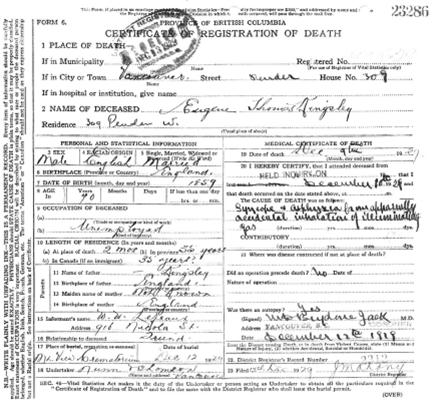Kingsley's Legacy
Submitted by Ben Isitt on
 Kingsley's death certificate
There is a tragedy to Kingsley's death. He died alone, and divorced from the movement that he had fanned to flame in the preceding three decades. Memories of his contribution to that movement were all but forgotten until recently. But this tragedy needs to be weighed against the immense success of the cause of a purely political socialism he helped usher into new relevancy.
Kingsley's death certificate
There is a tragedy to Kingsley's death. He died alone, and divorced from the movement that he had fanned to flame in the preceding three decades. Memories of his contribution to that movement were all but forgotten until recently. But this tragedy needs to be weighed against the immense success of the cause of a purely political socialism he helped usher into new relevancy.Kingsley kept alive and flourished the Province's critical journalistic tradition, and provided the logic by which political radicalism and a public critique of Capitalism could be performed in a legitimate, and respectable way. He did this while discreetly managing his disablement, which never stopped his seemingly tireless energy for campaigning, speaking and organizing throughout BC and Canada.
Eugene T. Kingsley's greatest gift to the present is the emergence of the political movement he all but started. The Federated Labor Party, itself rooted in the Socialist Party of Canada, would go on to become the seed behind the influential Cooperative Commonwealth Federation (CCF) established in the 1930s. The message of a politically class conscious organization, and driven by democratic sensibilities and representation of working class interests, would be the legacy of Eugene Kingsley, and his contributions to the Canadian political landscape should not be forgotten.
 Eugene T. Kingsley
Eugene T. Kingsley